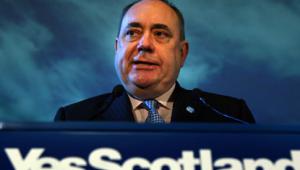Could a Conservative government in Westminster lead to Scotland’s secession from the United Kingdom?
As the Conservatives meet for their conference in Manchester, all eyes will be on David Cameron, the man most likely to be the next prime minister if the polls are accurate.
But could he also become the last prime minister of the United Kingdom, at least as we know it? Some believe that confrontation between a Scottish National Party government in Edinburgh and a Conservative Party government in Westminster could, as the Liberal Democrat deputy leader Vince Cable put it recently, lead to ‘conflict and possible secession’.
Why should a Tory government in London cause such a stushie in Scotland? Well, because of the enduring folk memory of the 1980s, when two vicious recessions destroyed the fabric of industrial Scotland. Many believe that the severe health problems experienced by Scots in some Glasgow constituencies are a direct result of the cataclysm that hit industrial communities 30 years ago.
Then came the poll tax. Margaret Thatcher imposed her flat-rate community charge on Scots a year ahead of England. She thought she was doing Tory Scotland a favour by averting the need for a rates revaluation.
In reality, the tax provoked a profound political reaction, which almost destroyed the Tory party north of the border and led inexorably to the setting up of the Scottish Parliament.
A year after the poll tax was introduced, the cross-party Scottish Constitutional Convention signed the Claim of Right for Scotland, demanding that sovereignty be restored to the Scottish people. It was – ten years later, after the Labour government of Tony Blair passed the Scotland Act in 1998.
The Tories never recovered. By 1997, they were completely wiped out. Even today, there is only one Conservative MP in the whole of Scotland, David Mundell. Had it not been for the Scottish Parliament, and proportional representation, which gave the Tories 18 seats in Holyrood, the Conservatives might well have disappeared as a political force altogether.
The Tories’ die-hard opposition to devolution didn't help (a singular irony since it was a Tory prime minister, Edward Heath, who first called for an elected assembly for Scotland). They became known as the ‘English Party’, inextricably bound up with the image and personality of Margaret Thatcher, or ‘that bloody woman’ as she was known on the doorsteps.
These folk memories die hard. Alex Salmond, the nationalist first minister of Scotland, will do everything in his power to keep them alive, if and when David Cameron enters Number 10. There has been no observable ‘Cameron bounce’ in Scotland. The SNP hopes that a Tory government will revive the culture of constitutional grievance that existed in the 1980s and 1990s, when it was widely said that the Tories lacked ‘a mandate to rule’ in Scotland.
In a climate of deep, centrally imposed, spending cuts, this is a distinct possibility. A disproportionately large number of Scots depend on the public sector for their jobs – and 10% cuts would mean tens of thousands of jobs lost.
Moreover, Cameron has hinted about cutting the number of Scottish MPs in Westminster. This is both to address the ‘West Lothian Question’ – where Scottish MPs can vote on laws that will apply only in England – and reform the Barnett Formula, which calculates public spending in Scotland.
Many people out of work, deep public spending cuts, reduced representation in Westminster – there’s no doubt that the Union could be in danger.
However, I suspect Cameron will not want to be the PM who presided over the break up of Britain. If reason prevails, he will compromise with Salmond, giving Holyrood greater tax powers in exchange for an end to the Barnett Formula, which many Tories believe gives Scots an unfair advantage in public spending.
Will Britain survive? Yes, but it might not be quite as we understand it today – more a federal country with Scotland largely self-governing. The union is dead, long live the union.
Iain Macwhirter is political commentator on the Sunday Herald










